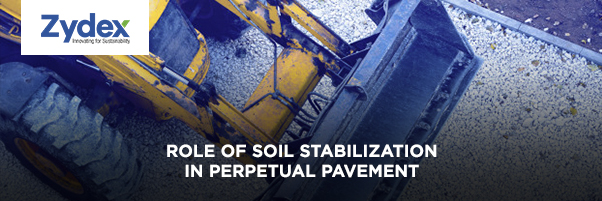Perpetual Pavements are pavements designed and constructed to last > 50 years, with maintenance restricted to the wearing course alone. In order for the pavement to perform through its design life, it is imperative to provide a strong, flexible bottom layer that resists cracking under heavy traffic loads and cyclic weather variations.
Soil bases are critical layers for any pavement, as it transfers the vehicular load to the ground level, allowing smoother rides. They form the foundation for the long term performance of the pavement. However, factors such as unavailability of good materials, variability in the available soils and greater affinity to water challenge the conventional construction methods as they lead to failures causing undulations and cracks. This presents a compelling case to find solutions that can improve the engineering properties of the in-situ soil. Various methods such as the use of geogrids and geotextiles, grouting, increasing the thickness of the subgrade etc. have been adopted over the years, to construct a strong base. One such method is soil stabilisation.
Soil stabilisation is the process of blending and mixing different materials, to improve the engineering properties of the soil. It not only helps to increase the strength of the soil, but also allows to arrest its swelling potential, allowing for better stress transfer thus preventing premature failures. Stabilizers such as cement, lime and bitumen emulsions have been used traditionally for soil stabilisation. However, each method comes with its own disadvantages, be it the environmental or health hazards, or cost effectiveness. Also, with depleting resources, the focus on sustainable construction practices has been ever increasing. New and improved methods are being preferred as they are cost-effective and allows construction of high performance, durable roads with reduced material consumption. This has paved the way for new and emerging chemical technologies that allows to improve the properties of the soil without any harmful effects, along with a keen eye on easy-to-use solutions that have proven its efficacy on field on field and widely accepted.
Zydex offers Terrasil (organosilane) and Zycobond (acrylic co-polymer), which are easy to apply additives for soil stabilisation, that significantly reduces water permeability, imparts higher strength and enhanced flexibility through nano-bonding. These properties make the soil bases non-deforming and dimensionally stable. As this change in the engineering property is permanent in nature, it enables the construction of all-weather water resistant, durable roads. This significantly improved strength and higher modulus with flexibility of soil bases can be utilized for reducing the overall thickness of the pavement, thus delivering a sustainable and perpetual road at the same cost.







